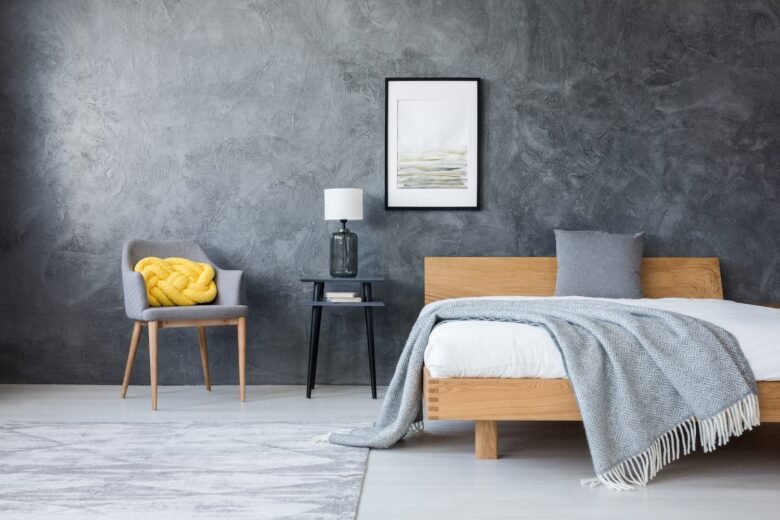Your bedroom is more than just a place to sleep; it should be a haven of peace that helps you fall asleep quickly and deeply. Many people cite anxiety and diet as the biggest factors that affect your sleep, but where you sleep is just as important. In your bedroom, everything from the temperature to the lighting to the clothing you choose can affect how well you fall asleep or stay awake. Creating a place where you can relax and feel comfortable can really make a difference in how rested you are each morning and how you feel as you start your day.
Choose a supportive, comfortable mattress and pillows
Your bed is one of the most important elements in your bedroom for sleeping. An uncomfortable couch or pillow that doesn’t support your head and neck can cause discomfort, spinal misalignment, and even persistent pain that can make it difficult to fall asleep.
If your old mattress is older than seven to 10 years, or if it’s sagging in the middle, you may need a new one. Choose a mattress that works for your body type and sleeping habits. Side sleepers generally do better with a medium to soft bed. Back or stomach sleepers may need more support. The same goes for pillows: choose one that is comfortable and keeps your neck straight.
Keeping your room cool is important for a good night’s sleep. Temperature: Temperature has a direct impact on how easily you fall asleep. As you get closer to bedtime, your body temperature automatically drops. This tells your brain to start the sleep process. If your room is too warm, this natural cooling process can slow down, making you restless and having trouble falling asleep.
For optimal sleep, most experts recommend keeping your bedroom temperature between 60 and 67 degrees Fahrenheit. Use a heater if necessary, as well as breathable clothing and light pajamas. In the colder months, you can adjust your comfort level by adding blankets without getting too warm.
Reduce light at night. Light has a major impact on your circadian rhythm, which regulates your sleep and wake times. Even a little bit of artificial light in your bedroom can slow down melatonin production, making it harder to fall asleep.
To make your room quieter and better for sleeping, invest in blackout curtains or blinds to block out light and early morning sunlight. Turn off or cover the lights on all electronic devices, such as chargers, alarm clocks, and electric lamps. For a better night’s sleep, choose a night light that emits a warm red or orange light instead of blue or white.
Use soothing colors and avoid too much decoration.
Colors can affect your mood and energy. For a relaxing space, bright or flashy colors are not good because they can wake you up. To make your bedroom feel more comfortable, try using soft colors such as light blue, green, brown, or light gray. These shades make you feel calm and relaxed, perfect for winding down before bed.
Also try to keep your bedroom simple and clutter-free. It’s hard to concentrate if there’s too much furniture, artwork, or other stuff. A clean and quiet room can help you calm down and signal to your brain that it’s time to relax.
Block out noise so you can rest undisturbed. Noise can often make it difficult to fall asleep. Traffic noise, barking dogs, or noisy neighbors, even a little bit, can keep you from falling into a deeper sleep. To block out noise, try using a white noise machine, silent curtains, or earplugs.
If you prefer more natural sounds, a ceiling fan or soft nature sounds like rain or ocean waves can help block out other noises and create a relaxing atmosphere. Eliminating noise from your bedroom helps calm your nervous system and allows you to focus on your sleep.
Turn off screens and electronics
Your bedroom should be a place to relax, not a place to get things done. Blue light from TVs, computers, and tablets can keep you awake and alert, making it difficult to fall asleep. The constant stream of notifications and messages can make you more anxious and make it harder to fall asleep.
Put away or turn off all electronic devices at least an hour before bed. If you use your phone as an alarm clock, charge it in your bedroom or somewhere other than a drawer. Using screen time for relaxing activities like reading, journaling, or stretching can help you sleep better and enjoy a more restful night.
Add soothing scents with natural aromatherapy A certain scent can really change your mood Relax your mind and body to help you sleep more deeply, without drugs or chemicals.
Keep your bedroom clean and fresh
A clean, well-ventilated bedroom is a more comfortable place to sleep. Breathing in dust, bacteria, or pet hair can restrict your breathing and affect your sleep. Open a window for a few minutes each day to let fresh air into the room, and vacuum or wash your sheets and blankets once a week.
Tiger tail, aloe vera, and rosemary are all great houseplants that purify the air and add a relaxing, natural feel to any room. A clean, well-ventilated space helps your mind and body relax.
Sleep and rest only in your bedroom
Try to sleep only in your bedroom and improve the connection between your brain and sleep. If you work, eat, or watch TV in your bed, your brain may see your bedroom as a place to do things, not a place to rest.
By separating your bedroom into a separate sleeping space, you can make it more functional and help your body relax the moment you enter. With this in mind, it will be easier to fall asleep quickly and sleep through the night.
A peaceful environment makes for a restful sleep. You don’t have to buy expensive electronics or completely remodel your bedroom to make it a more comfortable place to sleep. You can simply make small changes that work in harmony with your body’s natural physiological processes. A cool, dark, quiet, safe, and comfortable space helps your body and mind relax after a day and fall asleep easily. By making your bedroom a place to rest, you can feel healthier, more energized, and sleep better every day.




